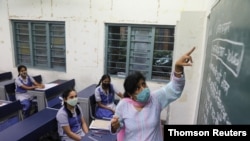Schools in Indian have begun to reopen after being closed for more than a year as cases of COVID-19 have started to decline.
The government gave the go-ahead for schools to reopen Tuesday in at least five states and union territories, including Delhi and Tamil Nadu. Schools did so cautiously, with strict COVID-19 protocols in place, including wearing masks, frequent hand washing, staggered lunch breaks, and limited seating capacity for social distancing in classrooms.
India closed most schools, colleges, and other educational institutions in March of 2020, as the pandemic began in an effort to curb the spread of the deadly virus. While many schools in urban or high-income areas moved to online learning, that was not an option to students in rural and low-income areas.
The U.N. children’s fund, UNICEF, says only one in four children in India have access to the internet and digital devices. Several reports and studies about Indian children during the pandemic found thousands of Indian children suffered learning loss, and they say a continued lack of in-person learning could create irreversible learning gaps.
The government now says the recent dramatic overall decline in COVID-19 cases made it safe to begin reopening schools. India’s health ministry Wednesday reported 41,965 new COVID-19 infections in the past 24 hours. In May, the daily rate peaked at more than 400,000.
But some parents remain concerned about recent surges, and they fear a third wave of infections could hold back their children. Likewise, some private schools are waiting until October to begin in-person learning.





